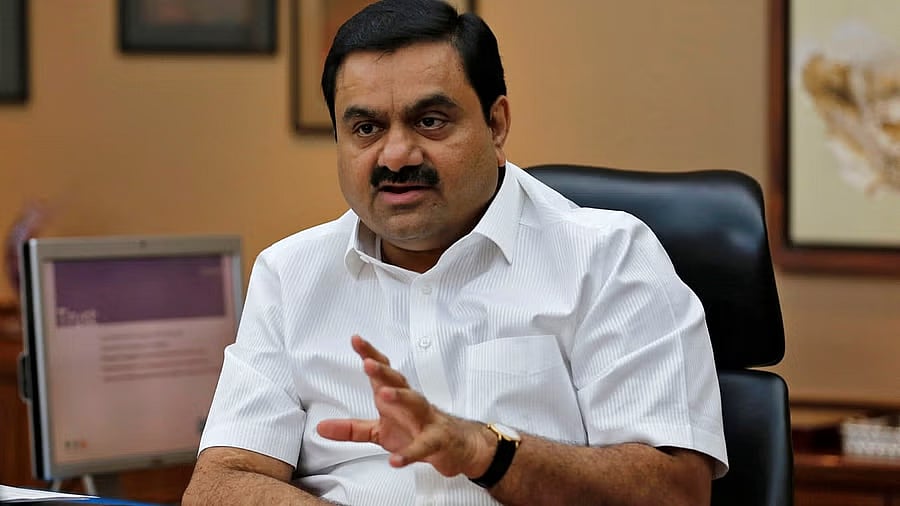
Gautam Adani.
Credit: Reuters File Photo
Business history like any other history is littered with examples of triumphs and disasters. On one hand, businesses innovate continuously to make our lives better. On the other, businesses once in a while engage in practices which can undo much of that progress.
During such times, one sees few business leaders standup to not just defend their credibility but also suggest a path forward. These moments create a legacy and lessons of moral leadership which is passed on to successive generations.
Indian business is currently placed at one such juncture where the ongoing saga of the Adani Group is seeing no end. Despite allegations, the Indian courts and the securities market regulator (the Securities Exchange Board of India (SEBI)) did not conduct any investigations. Then suddenly the saga took a new turn as action shifted to the United States.
The US courts and its securities market regulator, the Securities Exchange Commission (SEC), have indicted the top leaders of the same group of bribery. What is even more interesting is that US authorities have not found any wrongdoing in US, but in India! They have alleged that the officials had bribed Indian government officials to get power projects. As the Indian company raised funds for these power projects from the US investors, the US regulations applied on the Indian company. The US authorities, unlike their Indian counterparts, have investigated and now allege cases of bribery.
This new turn is as bizarre as it can get. The case first came to light in March 2023, and yet was ignored by Indian authorities. How come US authorities found wrongdoing when none was spotted by our agencies? One can only know about guiltiness if there is an investigation.
Amidst all this is the deafening silence of Indian business leaders. This is no trivial matter, and impacts the reputation of the entire Indian business community. The silence of Indian business leaders is even more perplexing as they have spoken about these irregularities in the past. Some of them have also been accorded a high status in society, and are thus accountable to the people.
After 1991, India not just liberalised its financial markets but benchmarked it with the rest of the world. The idea was that Indian corporates should not just be able to raise funds in Indian markets but globally too. Likewise, the doors opened for foreign investors to invest in Indian companies.
The key glue to achieving these twin objectives was meeting the high corporate governance standards. Hence, right from the beginning, the government and the securities market regulator focused on corporate governance.
What is corporate governance? Corporate governance entails all the basic rules, practices, and norms that guide the functioning of the company. It identifies the rights and responsibilities of the board, managers, and other stakeholders. Corporate governance goes beyond looking at businesses merely as a profitmaking entity to serving larger goals of ethics and moral responsibility. Though, adopting corporate governance is seen as voluntary, most listed companies have adopted them in some degree.
How to build discussion on corporate governance? The Government of India like in most such matters have formed committees.
It is interesting to note that the government/regulator has preferred market leaders to chair these committees, instead of relying on bureaucrats/technocrats. We have seen corporate governance committees headed by the who’s who of Indian industry: (late) J J Irani, Kumar Mangalam Birla, N R Narayana Murthy, Uday Kotak, among others. Apart from being chairs, several business leaders were also appointed members of these committees.
These leaders were appointed as apart from knowing about corporate governance, they were also seen as exemplars of righteous and moral behaviour. In the past, we have seen these leaders express their concerns over falling corporate governance even if it meant taking positions against the government and regulators. As the Satyam crisis broke out, the Confederation of Indian Industry (CII) constituted a taskforce comprising top business leaders to address corporate governance. This time around the business group under the spotlight is being felicitated by the same CII!
Where have all these upright standards disappeared in the case of the current events? They were even stunningly silent on electoral bonds which exposed the underbelly of thriving crony capitalism in India. Especially, when the matters have reached foreign courts. What we are seeing is a stunning silence as if corporate governance never mattered. The leaders are instead choosing to give lectures on all kinds of random things which show how they are out of sync with reality. They should instead appeal to the guardians to restore trust in corporate functioning and financial markets.
Warren Buffet once said, “It takes 20 years to build a reputation and five minutes to ruin it”. In Indian business history, reputations have been built for a much longer time and will take more than five minutes to ruin it. But then why give history a chance to ruin it?
Moreover, there is a possibility that other companies will also stop following the norms as they see little impact or fallout of not following them. This will have a bearing on financial markets as the small investors who are putting their hard-earned savings into the markets will be on the receiving side.
It is even more ironic as one of the recent committees (chaired by Uday Kotak) said this on corporate governance:
“…how can small suppliers of capital ensure that, once they invest their funds, owners and/or professional managers will invest their money responsibly and return some of the profits generated from such investments? Corporate governance deals with the mechanisms to address this key question.”
It’s high time Indian business leaders look at the mirror and ask: “Mirror, mirror on the wall, why am I allowing standards to fall?”
(Amol Agrawal is an economist teaching at Ahmedabad University.)
Disclaimer: The views expressed above are the author's own. They do not necessarily reflect the views of DH.